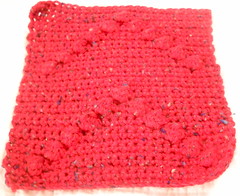Gevurah (Might) (also called Din [Judgment]) counterbalances Hesed (Lovingkindness). It is the side of the Divine most familiar to those with a superficial understanding of the Old Testament, the wrathful God of awful punishments. But as in other world religions, Divine attributes that may seem harmful are not necessarily negative once you understand their true function. Without Gevurah, the world would be so overwhelmed by God's love that it would be reabsorbed into the Divine; without Hesed, God's judgment would unleash forces of destruction on the world.
The seeds of the "Other Side" (Sitra Akhra), or demonic forces of evil are found in Gevurah, as well; the Zohar teaches that an excess of Gevurah is the source of Ultimate Evil. It is the balance of Justice and Mercy evoked repeatedly in the Hebrew Bible, that is the key to the world's thriving. And that balance, necessary in the Divine realm, is also essential in human endeavor.
This balance of love and might, of strength and compassion, of destruction and rebuilding is understood by many world religions. This concept is exactly what yin/yang expresses. It is the constant balancing act between good and evil in Christianity. The Hindu religion expresses this balance via different deities. Contrary to popular Western belief, these deities are not "individual gods." They are, rather, different representations of particular aspects of the one god, the source, known as Brahman. The "human" or physical representation of Brahman's aspects or attributes in the form of deities is a vehicle for the devotee to focus his or her attention, devotion or meditation on that particular aspect or attribute in a form more easily visualized and held in the mind.
For instance, the goddess Durga symbolizes the violent and destructive qualities of the loving Mother Goddess (Shakti). However, Durga protects mankind from evil and misery by destroying evil forces such as selfishness, jealousy, prejudice, hatred, anger and ego.
Gevurah is associated with Elohim as the name of God. Its color is red. (Notice, please the color of Durga's robes. Think, also of the traditional color associated with the Devil in Christian thought. Coincidence? Maybe. Maybe not. But definitely something to think about.)
This balance of love and might, of strength and compassion, of destruction and rebuilding is understood by many world religions. This concept is exactly what yin/yang expresses. It is the constant balancing act between good and evil in Christianity. The Hindu religion expresses this balance via different deities. Contrary to popular Western belief, these deities are not "individual gods." They are, rather, different representations of particular aspects of the one god, the source, known as Brahman. The "human" or physical representation of Brahman's aspects or attributes in the form of deities is a vehicle for the devotee to focus his or her attention, devotion or meditation on that particular aspect or attribute in a form more easily visualized and held in the mind.
For instance, the goddess Durga symbolizes the violent and destructive qualities of the loving Mother Goddess (Shakti). However, Durga protects mankind from evil and misery by destroying evil forces such as selfishness, jealousy, prejudice, hatred, anger and ego.
Gevurah is associated with Elohim as the name of God. Its color is red. (Notice, please the color of Durga's robes. Think, also of the traditional color associated with the Devil in Christian thought. Coincidence? Maybe. Maybe not. But definitely something to think about.)







No comments:
Post a Comment